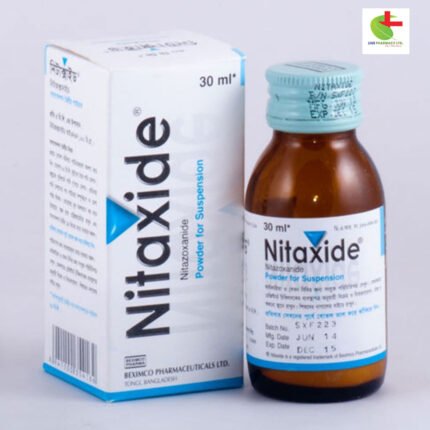

Flatameal DS
75.00৳ Bottle (200ml)
- Provides rapid symptomatic relief from hyperacidity, heartburn, and gas-related discomfort.
- Combines Aluminium Hydroxide, Magnesium Hydroxide, and Simethicone to neutralize gastric acid and reduce gas.
- Effective in preventing stress ulcers and gastrointestinal bleeding.
- Suitable for alleviating symptoms associated with peptic ulcers, gastritis, and indigestion.
 Brand
Brand
|
Beximco Pharmaceuticals Ltd |
|---|---|
 Generics
Generics
|
Aluminium Hydroxide + Magnesium Hydroxide + Simethicone |
 Type
Type
|
Oral Suspension |
Indications
This medication provides effective symptomatic relief from hyperacidity related to peptic ulcers, gastritis, peptic esophagitis, gastric hyperacidity, heartburn, sour stomach, and hiatus hernia. It is also beneficial in preventing stress ulcers and gastrointestinal bleeding. Additionally, it acts as an antiflatulent to ease symptoms of gas, including post-operative gas pain. The formula rapidly alleviates acid pain, disperses gastric foam, and facilitates the release of gas and air.
Composition
Each Tablet Contains:
- Dried Aluminium Hydroxide Gel BP (Al2O3, 47% minimum): 425.53 mg
- Magnesium Hydroxide BP: 400 mg
- Simethicone USP: 30 mg
Each 5 ml Contains:
- Aluminium Oxide (Equivalent to Aluminium Hydroxide Gel USP): 200 mg
- Magnesium Hydroxide (Equivalent to Magnesium Hydroxide Paste USP): 400 mg
- Simethicone USP: 30 mg
Pharmacology
This formulation combines non-systemic acid-neutralizing agents and antiflatulent components. It offers reliable and prolonged action. Aluminium Hydroxide and Magnesium Hydroxide neutralize gastric acid secreted by the stomach’s parietal cells, providing relief from ulcers. Simethicone’s antifoam properties help reduce gas bubbles in the gastrointestinal tract by forming a film of low surface tension, leading to the collapse of foam and aiding in gas expulsion.
Simethicone remains inert within the gastrointestinal tract, not interfering with gastric secretion or nutrient absorption. It is excreted unchanged in the feces after oral administration.
This preparation is useful for treating flatulence and meteorism, eliminating gas and foam from the gastrointestinal tract, and alleviating abdominal distension and dyspepsia. It’s also recommended prior to radiographic examinations.
Dosage & Administration
- Tablet: 1-2 tablets 1-3 hours after meals and at bedtime, or as directed by your physician.
- Suspension: 1-2 teaspoonfuls 1-3 hours after meals and at bedtime, or as directed by your physician.
Always follow your physician’s instructions for dosage.
Interaction
Antacids may affect the absorption rate and extent of other oral medications. They can decrease the bioavailability of drugs like theophylline, tetracycline, quinolone antibiotics, and others. Conversely, antacids can increase the bioavailability of drugs such as sulphonamides, levodopa, and enteric-coated aspirin.
Contraindications
This medication should not be used by patients with renal failure, hypophosphatemia, or those who are severely debilitated. It is also contraindicated in conditions of alkalosis and hypermagnesemia, especially if abdominal distention is due to intestinal obstruction.
Side Effects
Gastrointestinal side effects are rare but may include diarrhea, constipation, or regurgitation if taken in excessive amounts.
Pregnancy & Lactation
It is advisable to avoid antacid preparations during the first trimester of pregnancy.
Precautions & Warnings
Use with caution in patients with kidney disease.
Therapeutic Class
Antacids
Storage Conditions
Store below 30°C, protected from light and moisture. Keep out of reach of children.











Reviews
There are no reviews yet.